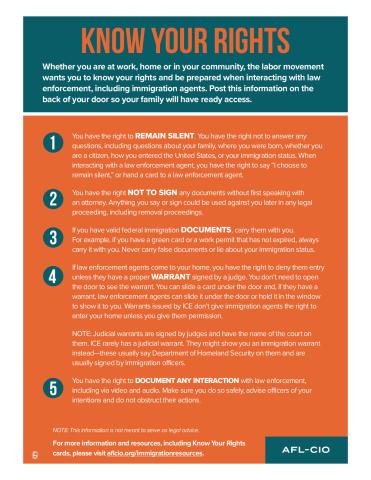As Central American families who have made the perilous journey through Mexico arrive at the U.S. border, here are 10 key things working people should know:
-
Staying home simply is not an option. Families undertake this life-threatening journey because the crime, violence and crushing poverty at home are so extreme that they see little choice but to flee in order to survive and try to build a better future.
-
We must address the root causes of this displacement. Unfortunately, flawed U.S. foreign and trade policies have exacerbated dangerous conditions in these countries, breeding violence and desperation. We need to fundamentally reimagine our relations in the region instead of scapegoating refugee families and denying their rights.
-
The answer is not more militarized border enforcement. Nativists in the U.S. have incorrectly labeled this as an “immigration” problem that only can be solved with enhanced border control. The majority of families are turning themselves in to authorities and have suffered violence or faced threats of violence that indicate a need for international protection.
-
Our laws require a fair hearing for asylum seekers. The U.S. has obligations under national and international law to ensure that people are not returned to dangerous situations—obligations our government cannot meet with enhanced border enforcement, detention, family separation or expedited removals.
-
Violence, crime and corruption are widespread in Central America. Honduras and El Salvador currently have the highest murder rates in the world. Organized crime has infiltrated the police force in many areas, and the military has a long history of human rights abuses. Government corruption frequently means authorities do not properly investigate violence against workers and union activists or, worse, are complicit in such acts.
-
Poverty and inequality in the region are on the rise. Inequality has increased in both Guatemala and Honduras over the past decade, and real wages in El Salvador actually decreased between 2004 and 2011. The majority of jobs in Central America remain in the informal sector, with no benefits and no safety net. Nearly two-thirds of people in Honduras live in poverty—the top 10% earn more than 55 times what the poorest 10% earn.
-
Workers’ rights violations have increased. Trade unions in the region report that labor repression has increased, especially in the expanding maquiladora sector. In both Guatemala and Honduras, employers routinely refuse to engage in collective bargaining and avoid paying workers the wages and benefits they are due. Too often, workers involved in union organizing are fired, threatened and even killed. Many Central American governments fail to respond to these abuses, intensifying the problems working families face.
-
The Central American Free Trade Agreement failed to deliver its promised economic benefits. During negotiations in 2005, CAFTA supporters argued the deal would create broad economic growth and raise labor standards. These claims have proved false. The “high-skilled” jobs promised for the maquila sector never materialized. CAFTA benefited corporations at the expense of working families by including provisions that drove up the price of vital medicines, restricted financial service regulations and gave businesses the right to sue governments in unaccountable “corporate courts” over public interest laws that threaten profits.
-
The CAFTA labor provisions are weak and have been implemented inadequately. Despite years of effort to ensure Central American workers can exercise their basic rights, governments still do not enforce their own labor laws and employers violate workers’ rights with impunity. Lack of decent work is one of the primary root causes of migration in the region, but the U.S. government has taken no independent action to enforce CAFTA’s labor provisions, and has been slow and ineffective when responding to complaints raised by labor unions.
-
The U.S. must reorient its foreign and trade policy. Central American children and their families will continue to flee their homes until they can live without constant fear of violence, exercise their rights without retaliation and access decent work. U.S. government policies should prioritize job creation, decent work, and meaningful protection of labor and human rights to reduce the “push factors” that breed desperation and displace working families.
Read more about the AFL-CIO’s vision for trade policies that promote global shared prosperity.


